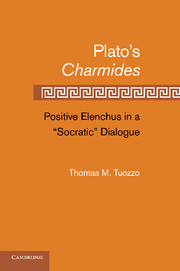Book contents
- Frontmatter
- Contents
- Acknowledgments
- Part One Approaching The Dialogue
- Part Two Approaching The Argument
- Part Three The Dialectical Investigation
- 5 σωϕροσύνη and Its Value
- 6 σωϕροσύνη as Self-Knowledge: Two Reformulations
- 7 Possibility of Self-Knowledge: Critian Formulation
- 8 Possibility of Self-Knowledge: Socratic Formulation
- 9 Return of the Value Question
- 10 Socrates??? Final Speech and Closing Scene
- 11 σωϕροσύνη, Knowledge, and the Good
- Works Cited
- General Index
- Index of Passages
6 - σωϕροσύνη as Self-Knowledge: Two Reformulations
Published online by Cambridge University Press: 05 February 2012
- Frontmatter
- Contents
- Acknowledgments
- Part One Approaching The Dialogue
- Part Two Approaching The Argument
- Part Three The Dialectical Investigation
- 5 σωϕροσύνη and Its Value
- 6 σωϕροσύνη as Self-Knowledge: Two Reformulations
- 7 Possibility of Self-Knowledge: Critian Formulation
- 8 Possibility of Self-Knowledge: Socratic Formulation
- 9 Return of the Value Question
- 10 Socrates??? Final Speech and Closing Scene
- 11 σωϕροσύνη, Knowledge, and the Good
- Works Cited
- General Index
- Index of Passages
Summary
The dialectical discussion that follows the speech in which Critias offers “knowing oneself” as the definition of σωϕροσύνη, and which continues almost to the end of the dialogue, is one of the most complex stretches of argument in the Platonic corpus. Despite how it might appear at first glance, the argument has a carefully worked-out structure, to which Plato provides reasonably clear signposts. It is essential for a correct understanding of the passage to take note of this structure and, in particular, to be aware of the progression in thought that it reflects.
One of the clearest signposts in the passage occurs at 167a9, where Socrates says:
Once again then, said I – third time for [Zeus] the Savior! – let us investigate, as though from the beginning (ὡς ἐξ ἀρχῆς), first, whether this is possible or not: to know, of the things a person knows and does not know, that he knows them and that he does not know them; and next, granting its possibility, what benefit there would be for us if we possessed this knowledge.
- Type
- Chapter
- Information
- Plato’s CharmidesPositive Elenchus in a 'Socratic' Dialogue, pp. 189 - 208Publisher: Cambridge University PressPrint publication year: 2011

